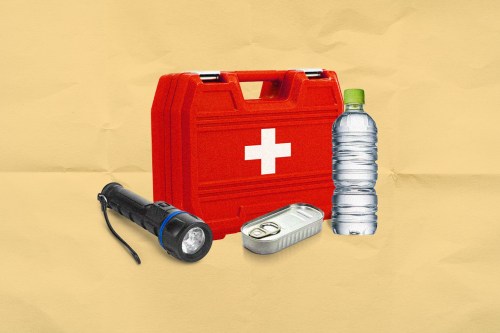Our editors independently select these products. Making a purchase through our links may earn Well+Good a commission
Phone calls during the work day. Cuddling in bed with anyone past 11 a.m. The Sundays’ mid-90s cover of “Wild Horses.” These are seemingly unrelated events, yet they’re all emotional triggers for me. The “why” behind each is something my therapist and I are working to unpack, but what I can say with confidence is that I’m glad I can now identify them for what they are. Because in the past, when I wasn’t able to pinpoint what led me to me feel panicked or off in some way, my mental well-being and important relationships often suffered as a result.
Experts in This Article
Chicago-based psychotherapist
licensed psychologist and creator of the My Inner Voice app
It makes sense why, too. Emotional triggers can lead to irrational, impulsive responses. And while that certainly sucks for the people who are experiencing the mental tumult, it can also be problematic for friends, partners, or other loved ones—especially if they don’t know the big picture of what your triggers are. So how can you respect your own sensitivities without lashing out, even if unintentionally, to people who really care?
Good news: Even if the root cause triggering you is subconscious, there’s still an easy way to spot it. For better or worse, emotional triggers will usually manifest in physical reactions. For instance, my go-to trigger reaction involves shallow breathing and a quick crying fit—essentially, a small-scale anxiety attack. Really, it can be any sort of fun (read: awful) physical stress or strain.
“Sometimes you can know you’ve gotten triggered because you feel like your heart is pounding or your chest or gut is tightening in a way that you know is way out of proportion to what just happened,” says psychologist Helene Brenner, PhD, author of I Know I’m in There Somewhere. “If this happens, you can try to reflect on it before you do something that you might regret later.”
Below, learn how to identify, communicate, and work on handling your emotional triggers—for the benefit of yourself and your loved ones.
How to spot emotional triggers
Even when everyone is objectively safe, emotional triggers can facilitate a sensation of feeling emotionally threatened when triggered. “While they may not be truly dangerous, emotional threats feel every bit as threatening to our survival as physical threats,” says Dr. Brenner. “When we feel that threatened, we tend to go into fight-or-flight mode very, very fast, reacting first and thinking about what we’re doing later. So, we may end up reacting in a way that, later, we don’t feel good about.”
Obviously, being able to recognize emotional triggers seems like a smart way to stop the hypothetical train from crashing, but unfortunately, that identifying aspect isn’t so easy to accomplish in practice. Every person is different, and, thus, emotionally triggered in different ways. So, unraveling the highly personalized intel requires dedicated thought. “The tough part about emotional triggers is that they’re not so easy to spot,” says Dr. Brenner. For instance, “it makes perfect sense to us when we get upset with our partner for saying ‘How are you?’ in a slightly wrong tone of voice.” But do you know why? And does your partner?
Sometimes, though, the best (and perhaps only) way to avoid getting triggered is to go through the experience once and then learn from it. When you’ve identified what, precisely, is at play, you can tackle the problem. And here’s the best part: You don’t have to do it alone.
How to manage emotional triggers short-term
“It’s hard to shift attention away from a powerful trigger,” says Aimee Daramus, Psy.D., licensed clinical psychologist and author of Understanding Bipolar Disorder. “You need something equally powerful. For people who have trained in meditation, that will usually help.”
If you want to be proactive in managing your emotional triggers, then adopting a meditation practice—even something like EFT tapping—might make a world of difference. The idea is that you’ll have something to center you whenever you’re shaken. But if this isn’t yet a developed coping technique for you, Dr. Daramus recommends a strong, possibly tactile distraction to pull your attention away.
“If it’s really severe, you might need something uncomfortable but harmless, like holding ice in your hands or tasting hot sauce to shock your system into diverting itself from the trigger,” she says. Oof, yikes. But it also doesn’t have to be that jarring or unpleasant, and ideally you want to gravitate towards things that self-soothe. “If you can, though, divert yourself by immersing yourself in sensory experiences that are safe and feel good, like good food, coffee, a beautiful object you can examine, a hug, music or snuggling your pet,” Dr. Daramus says.
How to manage emotional triggers longterm
This is a little bit more complex, and might require help from a mental health professional, like a therapist. Really, though, i goes back to being able to identify triggers when they happen.
“You need to understand what your triggers are and why that situation triggers you, and learn to shift your awareness fully to the here and now so you can stop repeating painful patterns,” says Dr. Daramus. “Eventually you want to shift your goal from avoiding triggers from the past to shaping your own future into what you want.
3 Specific strategies to help you handle emotional triggers
1. Try a safe space meditation (or another form of meditation)
This is to help you retreat to somewhere where you don’t feel you’re in danger…especially if you can’t physically retreat elsewhere.
“You create a safe space inside your head and go there when you start to feel triggered,” says Dr. Daramus. “Explore that imaginary environment with all of your senses. Mindful meditation works well for a lot of people, but others may find that it makes the triggering thoughts worse instead of better.”
2. Play a simple, mono-task-y video game to distract you
“Video games are great for stealing your attention away from anxiety and triggers,” says Dr. Daramus. “Try a simple logic game that takes a lot of concentration, like Tetris or Solitaire.”
3. Try the 5-4-3-2-1 technique
The 5-4-3-2-1 method can help take your mind off negative thoughts, and that includes the trigger at hand. “Try grounding yourself in the present moment by looking around you for five things you can see, four that you can touch, three you can hear, two you can smell and one you can taste,” Dr. Daramus says.
Dr. Brenner’s top suggestion for managing your triggers is to own your own triggers. That means recognizing the origin point, and communicating the issue—without blame—to loved ones.
“If you tell your partner ‘I got triggered because you did such-and-such,’ you’re still blaming your partner for your trigger and not really accepting that the trigger is in you,” Dr. Brenner says. “If instead, you say something like, ‘Wow! I really got triggered when you said X and Y, because I thought it meant that you…’ then you can have a real conversation about what your partner really did or didn’t do, and really did or didn’t mean.”
What does a healthy conversation look like? Dr. Brenner says it should identify why you got triggered in the first place, what past experiences led to this point, what your partner can do to help you not get triggered again, and what you what you can do to see things differently so that you can react in a calmer way. These ongoing dialogues invite transparency and can help you feel less alone when dealing with something that’s upsetting.
And, do communicate (rather than concealing or suppressing) triggers. Dr. Brenner points out that recent research has backed up that trying to deny or repress the negative emotions that are reflective of getting triggered doesn’t quite work out long-term. Bottling those emotions, rather, tends to come manifest in other areas of life.
“People who try to do that still exhibit lots of physiological signs of distress,” says Dr. Brenner. “It’s when people experience the feeling, but then re-appraise what’s happening so that they see it in a less negative and threatening light that they actually become physically calmer, emotionally less reactive, and more able to handle what is happening.”
This technique, she tells me, is called cognitive re-appraisal, and it’s an effective tool for controlling your emotions. According to research, though, in addition to being effective for improving long-term emotional regulation, it’s also adept at relieving short-term physiological symptoms. So this moment of pause and recognition can help you when you’re feeling triggered.
Obviously, dealing with your emotional triggers isn’t an overnight fix. But by committing to keep communication lines open with your loved ones—and with yourself—you can rest-assured that you’re on the right path.
Published November 21, 2021. Updated May 12, 2021.
Oh hi! You look like someone who loves free workouts, discounts for cult-fave wellness brands, and exclusive Well+Good content. Sign up for Well+, our online community of wellness insiders, and unlock your rewards instantly.
Sign Up for Our Daily Newsletter
Get all the latest in wellness, trends, food, fitness, beauty, and more delivered right to your inbox.
Got it, you've been added to our email list.










